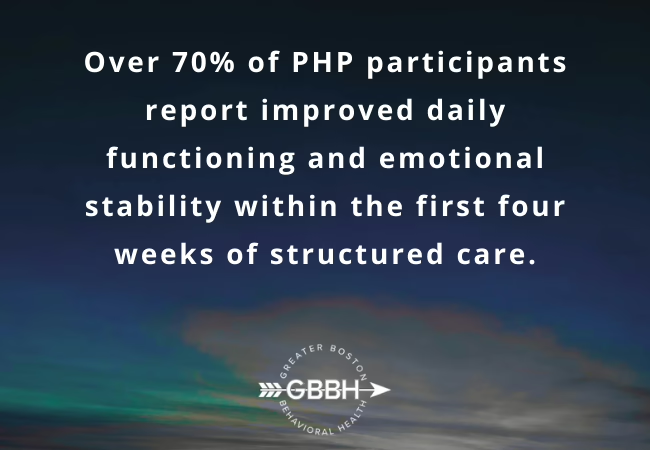Recovery from mental health or substance use disorders doesn’t happen overnight. For many individuals transitioning out of a psychiatric crisis, detox, or inpatient care, maintaining momentum is often the hardest part. That’s where a structured routine—like the one found in a Partial Hospitalization Program (PHP)—makes all the difference.
At Greater Boston Behavioral Health, we’ve seen how consistency, routine, and therapeutic structure create a stable foundation for healing. Our Partial Hospitalization Program in Massachusetts is designed not just to treat symptoms, but to rebuild lives through dependable daily schedules, peer engagement, therapeutic consistency, and skill-building.
In this in-depth guide, we’ll explore why structure matters in recovery, how it’s built into PHPs, and why it’s especially valuable after detox, inpatient stabilization, or repeated relapses.
Why Structure Is Vital in Mental Health Recovery
Structure gives shape to healing. For individuals managing depression, anxiety, trauma, bipolar disorder, or co-occurring disorders, a lack of routine often leads to:
- Irregular sleep patterns
- Missed meals or poor nutrition
- Skipped therapy or medication
- Social withdrawal
- Heightened emotional reactivity
- Impulsive behavior or relapse
A structured routine offers safety, stability, and clarity—especially when the brain and body are relearning how to function outside of survival mode. It reduces decision fatigue, increases accountability, and fosters a sense of control.
What Is a Partial Hospitalization Program (PHP)?
A Partial Hospitalization Program is an intensive outpatient mental health treatment option that provides clinical structure during the day (usually 5–6 hours) while allowing individuals to return home at night. It’s ideal for:
- People stepping down from an inpatient treatment program in Massachusetts
- Individuals transitioning after crisis stabilization or detox
- Those needing more support than traditional outpatient care can offer
- Clients with emotional dysregulation or behavioral concerns needing anger management therapy in Massachusetts
PHP combines multiple forms of therapy, including:
- Individual counseling
- Group therapy (CBT, DBT, trauma-informed care)
- Medication management and psychiatric evaluation
- Psychoeducation and skills development
- Family therapy and case management
How Structure in PHP Promotes Healing
1. Establishes Daily Predictability
Many individuals recovering from mental illness experience chaotic or unpredictable routines. PHP provides a consistent schedule where clients know what to expect each day:
- Morning check-ins
- Group sessions
- Skills workshops
- Scheduled meals and breaks
- Afternoon therapy and planning
This daily rhythm reduces anxiety, builds safety, and helps re-establish basic life habits like waking up, showing up, and following through.
2. Promotes Emotional Regulation
Conditions like depression, PTSD, bipolar disorder, and borderline personality disorder often cause overwhelming emotional shifts. Without a structured environment, those emotions can lead to harmful behaviors.
In our mental therapy programs in Massachusetts, PHP includes:
- DBT-based sessions for emotion regulation
- Anger management therapy in Massachusetts to control reactivity
- Mindfulness training and grounding exercises
- Skills groups on distress tolerance
By offering these tools daily, clients develop the ability to manage intense emotions safely and consistently.
3. Encourages Therapy Engagement
In traditional outpatient care, clients may attend therapy once per week. In PHP, they engage with therapy multiple times daily. This increased exposure results in:
- Stronger rapport with clinicians
- Faster progress on treatment goals
- Greater self-awareness and insight
- More time to practice skills between sessions
Structured PHP therapy allows for sustained emotional processing, goal setting, and real-time behavior adjustment.
4. Supports Healthy Lifestyle Habits
Mental health recovery is deeply tied to physical health. Our PHP routine reinforces holistic wellness by incorporating:
- Set mealtimes and breaks
- Encouragement of regular sleep routines
- Education on nutrition, hygiene, and physical activity
- Journaling and reflection periods
- Habit tracking and reinforcement
These habits form the foundation for independent living and help reduce triggers that may contribute to relapse or emotional instability.
5. Facilitates Real-Life Skill Building
Clients in PHP benefit from life-skills workshops that help them function more confidently outside of treatment. Our mental health programs in Massachusetts include modules on:
- Time management
- Setting and maintaining boundaries
- Managing interpersonal conflict
- Communication strategies
- Crisis planning and relapse prevention
These lessons are integrated into the daily schedule so clients can practice in a safe environment and receive feedback from clinicians and peers.
6. Creates a Safe, Peer-Supported Environment
PHP creates a structured community where clients feel supported and less alone. Group therapy and shared schedules foster:
- Connection with others on a similar path
- Peer accountability and encouragement
- Practice for real-world social interactions
- Exposure to different perspectives and coping styles
The routine includes time for group processing, informal conversation, and emotional check-ins—building trust and reducing isolation.
7. Provides Transitional Support After Inpatient Care
Leaving an inpatient treatment program in Massachusetts or a residential treatment program in Massachusetts can be jarring. The sudden return to unstructured life increases the risk of relapse or emotional collapse.
PHP offers a smoother transition with:
- Therapeutic intensity without hospitalization
- A gradual reintroduction of independence
- Daily access to psychiatric and therapeutic care
- Step-down planning into Intensive Outpatient Programs in Massachusetts
It’s a critical bridge between crisis stabilization and sustainable recovery.
What Does a Typical Day in PHP Look Like?
| Time | Activity |
|---|---|
| 9:00 AM | Morning check-in, intention setting |
| 9:30 AM | Group therapy (CBT, DBT, trauma-focused) |
| 11:00 AM | Skills group (emotion regulation, coping strategies) |
| 12:00 PM | Lunch and informal peer time |
| 1:00 PM | Individual therapy or psychiatric appointment |
| 2:00 PM | Life skills workshop (boundaries, relapse prevention) |
| 3:00 PM | Closing group and daily reflection |
This structure is designed to balance emotional processing, practical skill development, psychiatric support, and peer connection.
PHP in the Continuum of Care
Recovery is not linear. Our programs offer flexibility and step-down options based on clinical progress:
| Program | Level | Best For |
|---|---|---|
| Inpatient Treatment | Highest | Active crisis, 24/7 care needed |
| PHP | High | Post-crisis, intensive therapy without overnight stay |
| IOP | Moderate | Step-down from PHP, part-time support |
| Outpatient Therapy | Low | Maintenance, long-term healing |
Our admissions team works closely with each client to assess the right level of care and create a customized recovery plan.
Why Choose Greater Boston Behavioral Health for PHP?
As a leading mental health treatment center in Massachusetts, we offer:
- Individualized treatment plans based on diagnosis, goals, and history
- Full clinical team: licensed therapists, psychiatrists, case managers
- Special tracks for emotional regulation, trauma, and co-occurring disorders
- Integrated anger management therapy in Massachusetts
- A compassionate, trauma-informed environment
- Smooth transitions from inpatient to PHP to IOP
We believe recovery isn’t just about managing symptoms—it’s about rebuilding a meaningful life with structure, community, and support.
Conclusion
If you or someone you love is feeling overwhelmed, adrift, or stuck after crisis care or outpatient therapy, our Partial Hospitalization Program in Massachusetts can offer the stability, support, and structure needed to move forward. Call us today at 888.278.0716 to learn more or schedule a confidential consultation. You don’t have to navigate recovery alone—we’re here to help you build a better, more structured tomorrow.
FAQ on Structured Routine in PHP
Why is a structured routine important in mental health recovery?
A structured routine provides stability, predictability, and accountability—three things that help reduce anxiety, manage symptoms, and rebuild daily functioning after a crisis or hospitalization.
What kind of structure does PHP offer?
PHP includes daily schedules with group therapy, individual counseling, psychiatric support, skill-building workshops, and designated breaks. This balance of structure and flexibility supports consistent emotional and behavioral progress.
Can a structured routine help with anger issues or emotional outbursts?
Yes. Our PHP includes anger management therapy in Massachusetts that’s built into the daily schedule. This helps clients develop tools for regulating emotions in real-time within a structured, supportive setting.
How does structure in PHP help after inpatient treatment?
PHP provides a transitional bridge between 24/7 inpatient care and independent living. It allows clients to apply new skills in real life while still receiving intensive therapeutic support.
Is the schedule the same every day?
While the overall structure remains consistent, the therapy topics and group focuses vary throughout the week to target different areas of recovery and avoid monotony.
What if I struggle with keeping a routine?
That’s okay—PHP is designed to help you build structure gradually. Our clinicians will support you in developing and maintaining a routine that works for your needs and goals.
How long do clients typically stay in PHP?
Most individuals participate in PHP for 2–4 weeks, depending on clinical progress. Many then step down into our Intensive Outpatient Program in Massachusetts or outpatient therapy.


